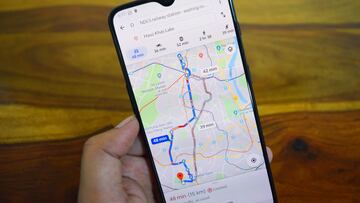How to save on gasoline with a Google Maps trick
The popular mapping app allows users to choose the most ecological route, helping motorists to save gas and help the environment.

With the price of fuel still painfully high, Google Maps has introduced a new option to help motorists save a few bucks on their journeys and reduce their carbon footprint too.
In the past when calculating a route, Google Maps has offered a few alternatives: the fastest, the shortest, without tolls... But now there is also the option to choose the most ecological path, which is the route with the least amount of gasoline used.
The application, which uses artificial intelligence developed by the National Renewable Energy Laboratory of the United States (NREL), analyzes different variables such as the duration of the journey, the inclination of the route and the expected traffic.
If the environmental option is selected, Google Maps will opt for the route where the road is flatter and the speed more constant (fewer traffic lights and traffic jams) to improve fuel efficiency and reduce the amount of gasoline used.
How to find Eco Friendly Driving suggestions on Google Maps https://t.co/5AjicFA2ml pic.twitter.com/O4wdggqO3s
— Phandroid (@Phandroid) April 21, 2022
NREL fellow Jeff Gonder points explains: “Google Maps green routing not only brings fuel-efficient technology from the lab to the road, it has enormous potential to significantly reduce emissions and save drivers money on gasoline, which is good for both people and the planet.”
The steps to follow to choose the most efficient route
Related stories
Drivers can opt for the greenest route in the same way that they may previously have chosen the fastest route. When entering a destination, next to the blue line that indicates the suggested path, there is also a grey line with the eco symbol of a leaf. This is the most low-emission route to your chosen destination, and Google Maps will give an estimated time alongside it. Simply select this route to begin the guidance.
Assuming that the fastest route is not the same as the most efficient, Google Maps will present data on the respective carbon dioxide emissions, fuel savings and the time difference of each journey so that the user can make an informed decision.


